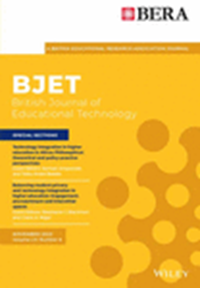Value-sensitive design of chatbots in environmental education: Supporting identity, connectedness, well-being and sustainability
Abstract
While offering the potential to support learning interactions, emerging AI applications like Large Language Models (LLMs) come with ethical concerns. Grounding technology design in human values can address AI ethics and ensure adoption. To this end, we apply Value-Sensitive Design—involving empirical, conceptual and technical investigations—to centre human values in the development and evaluation of LLM-based chatbots within a high school environmental science curriculum. Representing multiple perspectives and expertise, the chatbots help students refine their causal models of climate change's impact on local marine ecosystems, communities and individuals. We first perform an empirical investigation leveraging participatory design to explore the values that motivate students and educators to engage with the chatbots. Then, we conceptualize the values that emerge from the empirical investigation by grounding them in research in ethical AI design, human values, human-AI interactions and environmental education. Findings illuminate considerations for the chatbots to support students' identity development, well-being, human–chatbot relationships and environmental sustainability. We further map the values onto design principles and illustrate how these principles can guide the development and evaluation of the chatbots. Our research demonstrates how to conduct contextual, value-sensitive inquiries of emergent AI technologies in educational settings.
Practitioner notes
What is already known about this topic
- Generative artificial intelligence (GenAI) technologies like Large Language Models (LLMs) can not only support learning, but also raise ethical concerns such as transparency, trust and accountability.
- Value-sensitive design (VSD) presents a systematic approach to centring human values in technology design.
What this paper adds
- We apply VSD to design LLM-based chatbots in environmental education and identify values central to supporting students' learning.
- We map the values emerging from the VSD investigations to several stages of GenAI technology development: conceptualization, development and evaluation.
Implications for practice and/or policy
- Identity development, well-being, human–AI relationships and environmental sustainability are key values for designing LLM-based chatbots in environmental education.
- Using educational stakeholders' values to generate design principles and evaluation metrics for learning technologies can promote technology adoption and engagement.




 求助内容:
求助内容: 应助结果提醒方式:
应助结果提醒方式:


